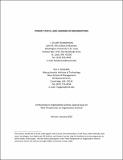Power, status, and learning in organizations
Author(s)
Bunderson, J. Stuart; Reagans, Ray Eugene
DownloadPower, Status, and Learning (Bunderson and Reagans).pdf (228.4Kb)
OPEN_ACCESS_POLICY
Open Access Policy
Creative Commons Attribution-Noncommercial-Share Alike
Terms of use
Metadata
Show full item recordAbstract
This paper reviews the scholarly literature on the effects of social hierarchy—differences in power and status among organizational actors—on collective learning in organizations and groups. We begin with the observation that theories of organization and group learning have tended to adopt a rational system model, a model that emphasizes goal-directed and cooperative interactions between and among actors who may differ in knowledge and expertise but are undifferentiated with respect to power and status. Our review of the theoretical and empirical literatures on power, status, and learning suggests that social hierarchy can complicate a rational system model of collective learning by disrupting three critical learning-related processes: anchoring on shared goals, risk taking and experimentation, and knowledge sharing. We also find evidence to suggest that the stifling effects of power and status differences on collective learning can be mitigated when advantaged actors are collectively oriented. Indeed, our review suggests that higher-ranking actors who use their power and status in more “socialized” ways can play critical roles in stimulating collective learning behavior. We conclude by articulating several promising directions for future research that were suggested by our review.
Date issued
2011-09Department
Sloan School of ManagementJournal
Organization Science
Publisher
Institute for Operations Research and the Management Sciences
Citation
Bunderson, J. S., and R. E. Reagans. “Power, Status, and Learning in Organizations.” Organization Science 22.5 (2010): 1182–1194.
Version: Author's final manuscript
ISSN
1047-7039
1526-5455